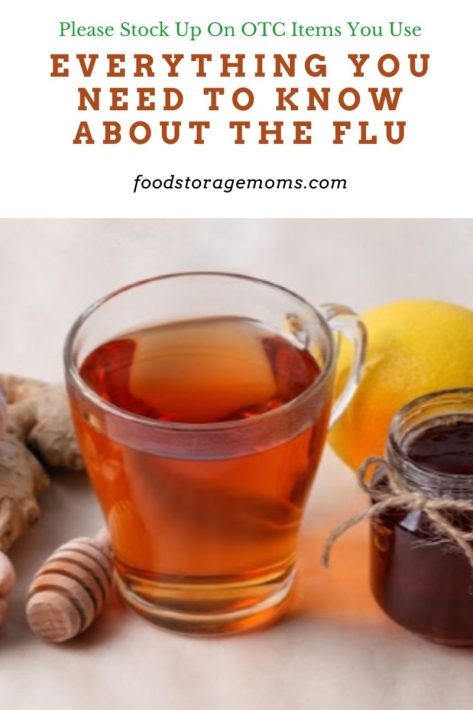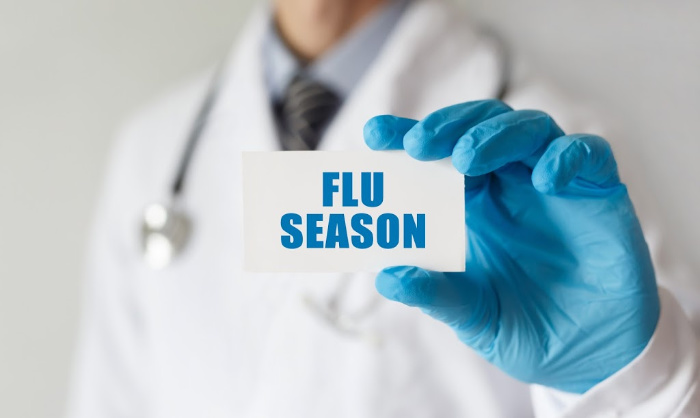
Today, it’s all about everything you need to know about the flu. There’s nothing more dreadful about your health than having the flu symptoms (besides severe illnesses). It seems like a few years can go by where you avoid it, but eventually, the flu virus catches up with you. Please refer to the CDC for accurate information on the flu, viruses, COVID-19, or bacterial infection.
Continue reading to discover everything you need to know about the flu. This is especially true if you’re a parent or guardian of children spending daily in a daycare or public school.
Those places are like breeding grounds for viruses, and children, along with their parents, sometimes have to pay the price.

Doctors and employers will encourage you to get a flu vaccination that protects you against the different strains. This way, you aren’t missing out on school or work.
I just wanted to give you the heads-up that I will not discuss whether I am for or against flu shots. Thanks for understanding.
You need to know a lot about the flu, from how it spreads to how to prevent it and what to do when you get it. This is everything that you need to know about the flu.
Everything You Need to Know About the Flu

The flu, or influenza, is a respiratory infection caused by influenza viruses. Every flu virus is extremely contagious and can infect the throat, nose, and even lungs in some cases.
There are also different ranges of it, from mild to more severe, and in some cases, it can even cause death. It’s also different from the common cold, as it can come on quite suddenly.
How Many Types are there?
Not all flu are the same. Some are mild, while others are more severe. There are four flu strains: A, B, C, and D. Depending on which strain, you’ll be fighting flu symptoms for around 7 to 10 days.
Last year, I contracted influenza A. It hit me hard, and I did have the vaccination. I’m 74 and felt I needed protection from whatever I am exposed to. I was so sick, and as you know, I am now on oxygen 24/7. The doctors are not sure what has caused the damage to my lungs; it may even have been Covid. I have a lot of scarring and have never smoked or vaped in my life. It’s so frustrating.
How It Spreads
Influenza viruses are spread through tiny drops of spittle or mucus that people cough, sneeze, or simply talk about. If the virus lands on another person’s mouth or nose, it can spread.
Often, the flu can be picked up by touching a surface where the flu virus is lingering and then unconsciously using that same hand to touch your mouth, nose, or eyes.
Flu-Like Symptoms
There’s a wide range of uncomfortable symptoms that you may experience when you’ve caught the flu. Symptoms may include a fever, chills, body aches, tiredness, headache, cough, sore throat, and a stuffy or runny nose.
Vomiting and diarrhea often follow as your body works to flush the virus out of your system. Sometimes, people can have the flu, even without a fever. You will also notice a loss in appetite during your illness.
People at High Risk
There’s no telling where the flu epidemic will strike, as it can affect anybody, though a weakened immune system increases the possibility.
Severe cases of the flu are more likely to affect children under 5, pregnant women, and people older than 65.
Older individuals who have chronic medical issues, including asthma, heart disease, and diabetes, are also at high risk.
Best Way to Prevent It
There are several ways to prevent the flu, but the best approach may be to get a flu vaccination every year. Not surprisingly, nearly half of Americans don’t get the vaccination.
The vaccine protects against several common flu viruses or decreases the severity of flu-like symptoms.
It’s also important to monitor your sick family members closely. Remember to wash your hands often with soap and hot water. Keeping surfaces clean with a disinfectant can also prevent germs from spreading as easily.
These are especially important reminders during flu season, which is typically at its peak from December through February.
Taking vitamin C may also ward off a flu virus by strengthening your immune system. It might not keep the virus away altogether, but it will lessen the symptoms and give you time to heal afterward.
It’s Too Late!
If you become sick with the flu, it’s vital that you stay home and away from others. It’s also essential to keep your mouth and nose covered when you sneeze, cough, or blow your nose.
Afterward, remember to wash your hands. Your body needs plenty of rest. Some people seek comfort by running a humidifier or staying in a steamy bathroom.
While missing school or work can be frustrating, doctors will tell you to stay home another 24 hours even after the fever has vanished. That way, you ensure that the virus will not spread to others.
What To Eat and Drink When You Have the Flu

Your body may tell you not to eat, or you won’t feel the need to. But if you are hungry, you don’t want to eat a big, hearty meal when you have the flu.
That may cause you to throw it up. Eat foods like broth, chicken soup, oatmeal, yogurt, and fruits containing vitamin C.
While your body is flushing the virus out, becoming dangerously dehydrated is easy. It’s essential to drink plenty of liquids.
Doctors will tell you to drink at least 64 ounces each day. It also doesn’t have to be all water. Gatorade and Powerade can help replace your electrolytes from all the vomiting or diarrhea you may have been experiencing.
If you’re still having trouble keeping fluids down, try using Pedialyte to help your body get the nutrition that it needs. You may want to try these Natural Remedies.
When to See a Doctor/Head to the ER
Everything you need to know about the flu. For people that are older than 65 years of age and are just beginning to experience the symptoms of the flu, it’s best that you see a doctor.
The same holds true if you’re pregnant, as you run a higher risk for a more severe case.
You’ll also want to go to the doctor if your condition appeared to get better, but then became worse again. If you’re noticing pain in certain areas, or if your conditions haven’t improved within one to two weeks. Listen to your gut or intuition.
If you are experiencing symptoms such as dizziness, loss of consciousness, difficulty breathing, confusion, or severe vomiting, you need to get yourself to the emergency room.
How To Stop Influenza In Your Home
Final Word
The flu…who needs it? This is everything that you need to know to be able to fight back against it. Have you ever experienced a moderate to a severe case of the flu?
What were your symptoms and how long was the recovery process? I’m glad you could read everything you need to know about the flu. May God bless this world, Linda
Copyright Images: FLU AdobeStock_120527288 Narozhnii, Flu Stuff AdobeStock_286791019 MissKaterina, FLU Season AdobeStock_178959142 Michail Petrov
The post Everything You Need to Know About the Flu appeared first on Food Storage Moms.
from Food Storage Moms
No comments:
Post a Comment